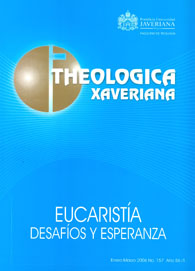Abstract
La Eucaristía: pan de esperanza, comunidad en camino”, medita sobre el peregrinar de la Iglesia como comunidad que ha nacido de la muerte resucitada del señor Jesús. De la comunión de vida con el Crucificado, todos los unidos en la sangre del Señor alimentan la esperanza de la nueva humanidad inaugurada en la resurrección. Esta humanidad nueva es anticipación de futuro, presencia viviente y radical de Jesús que trasforma el sacrificio en solidaridad sin fin, en esperanza futura que en vez de hacer olvidar la cruz, la asume. Al asumir la cruz, la eucaristía encierra la plenitud de lo histórico, alimenta el recuerdo esperanzado del amor de Dios acontecido en nuestra historia, pero llamado a la consumación definitiva, cuando lo provisional de la misma historia haya desaparecido, porque ha sido trasformado y transubstanciado en historia definitiva por el espíritu de Jesús, que es Cristo resucitado.
Esta revista científica se encuentra registrada bajo la licencia Creative Commons Reconocimiento 4.0 Internacional. Por lo tanto, esta obra se puede reproducir, distribuir y comunicar públicamente en formato digital, siempre que se reconozca el nombre de los autores y a la Pontificia Universidad Javeriana. Se permite citar, adaptar, transformar, autoarchivar, republicar y crear a partir del material, para cualquier finalidad (incluso comercial), siempre que se reconozca adecuadamente la autoría, se proporcione un enlace a la obra original y se indique si se han realizado cambios. La Pontificia Universidad Javeriana no retiene los derechos sobre las obras publicadas y los contenidos son responsabilidad exclusiva de los autores, quienes conservan sus derechos morales, intelectuales, de privacidad y publicidad.
El aval sobre la intervención de la obra (revisión, corrección de estilo, traducción, diagramación) y su posterior divulgación se otorga mediante una licencia de uso y no a través de una cesión de derechos, lo que representa que la revista y la Pontificia Universidad Javeriana se eximen de cualquier responsabilidad que se pueda derivar de una mala práctica ética por parte de los autores. En consecuencia de la protección brindada por la licencia de uso, la revista no se encuentra en la obligación de publicar retractaciones o modificar la información ya publicada, a no ser que la errata surja del proceso de gestión editorial. La publicación de contenidos en esta revista no representa regalías para los contribuyentes.


